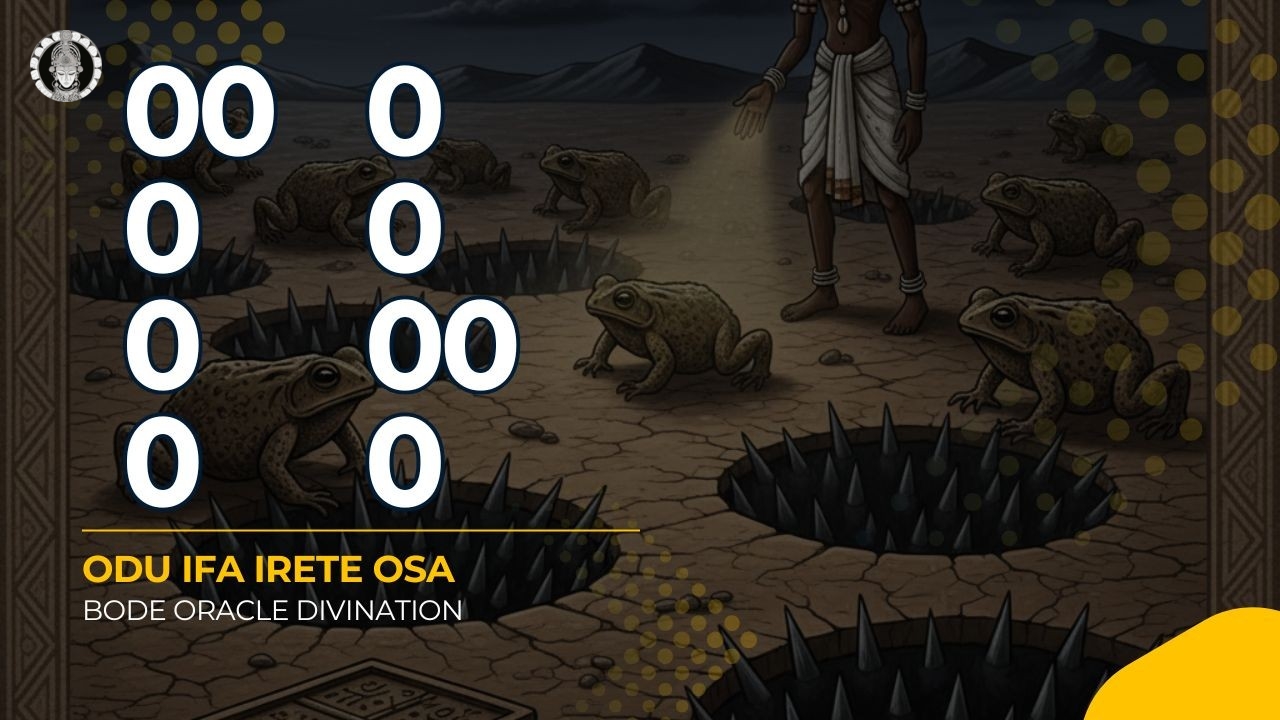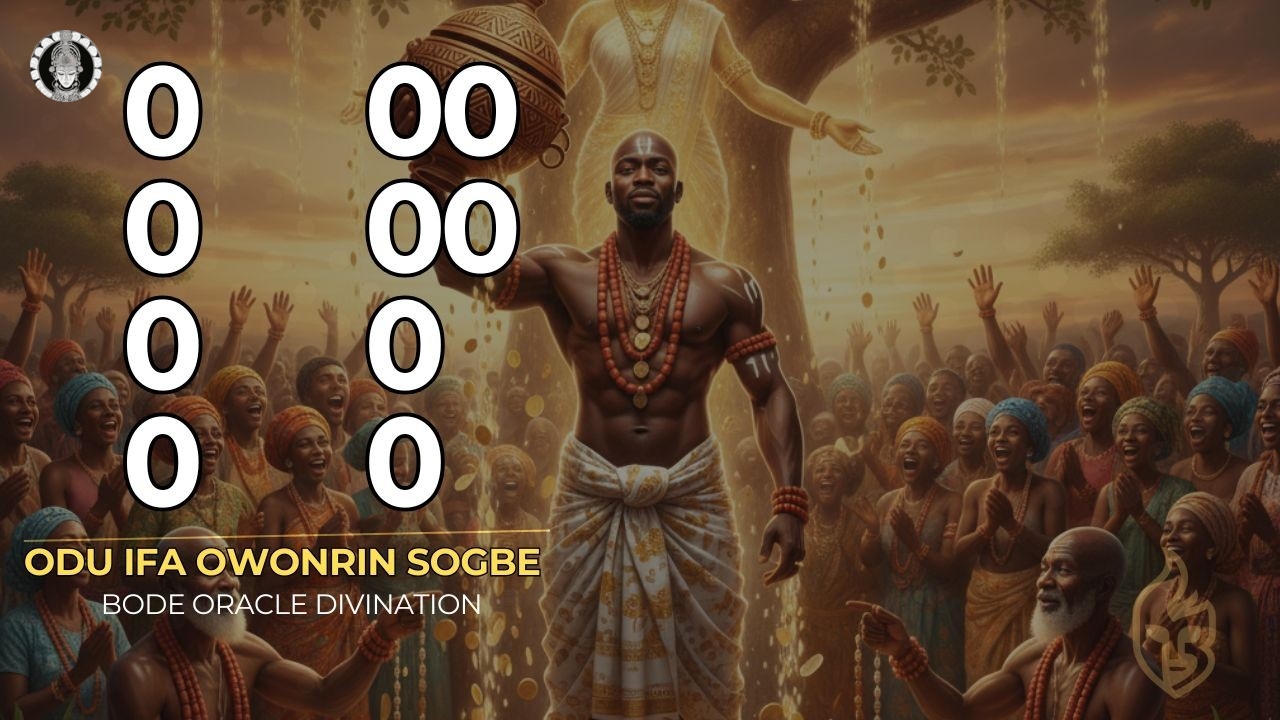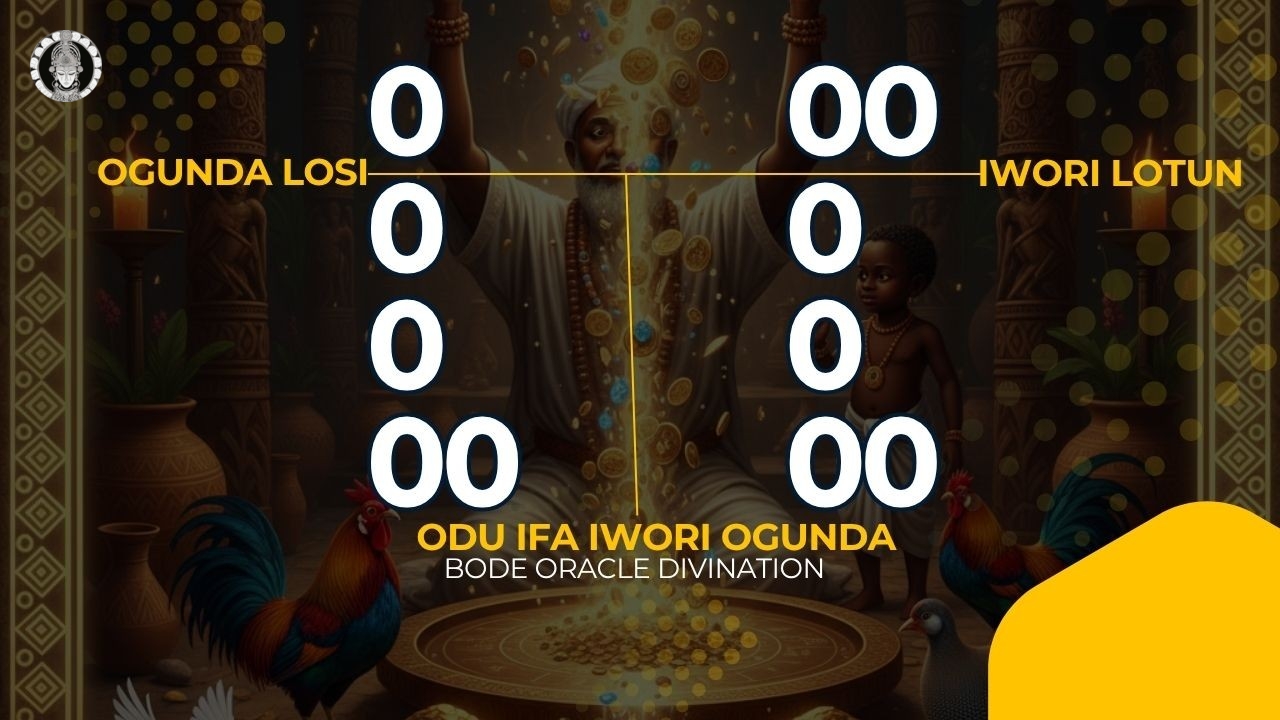Introduction to Odu Ifa Iwori Ogunda (Iwori Aweda)
Odu Ifa Iwori Ogunda, known by its praise name Iwori Aweda, stands as one of the most philosophically profound divination signs within the 256 sacred Odu of the Ifa corpus. The name "Iwori Aweda" translates as "the one who does not rely on medicine but on sacrifice"—a principle that reverberates through every story and teaching contained within this Odu. This fundamental philosophy distinguishes Iwori Aweda from many other Odu and establishes its unique position in Ifa wisdom.
At the heart of Iwori Aweda lies a revolutionary spiritual concept: true power and lasting transformation come not through magical medicines, charms, or mystical preparations (oogun), but through proper sacrifice (ebo), righteous conduct (iwa rere), and faithful devotion to divine principles. This teaching challenges the common human tendency to seek shortcuts through magical means while neglecting the more demanding path of ethical behavior and consistent spiritual practice.
The repeated refrain throughout this Odu—"Eda ogbogun ebo ni, Ifa ni ka mon se dada" (The person does not rely on medicine but on sacrifice, Ifa says one must maintain good conduct)—serves as both warning and promise. It warns against placing excessive faith in mystical solutions while neglecting spiritual fundamentals, and promises that those who prioritize sacrifice and good character will receive blessings that no medicine can provide.
When Iwori Ogunda appears in divination, it typically indicates that the person has been tempted to rely on magical solutions, spiritual shortcuts, or powerful medicines to solve their problems. The Odu redirects their focus toward the more sustainable path of regular sacrifice, ethical living, and proper propitiation of spiritual forces. The teachings within Iwori Aweda address marriage, wealth, protection from enemies, and the crucial relationship with one's Ori (inner spiritual head/destiny), all filtered through this central philosophy of sacrifice over sorcery.
For comprehensive background on the Ifa system, explore our guide to the 16 Odu Ifa and their meanings. To understand the broader context of Ifa divination, consult this academic resource on African traditional religions and Ifa divination.
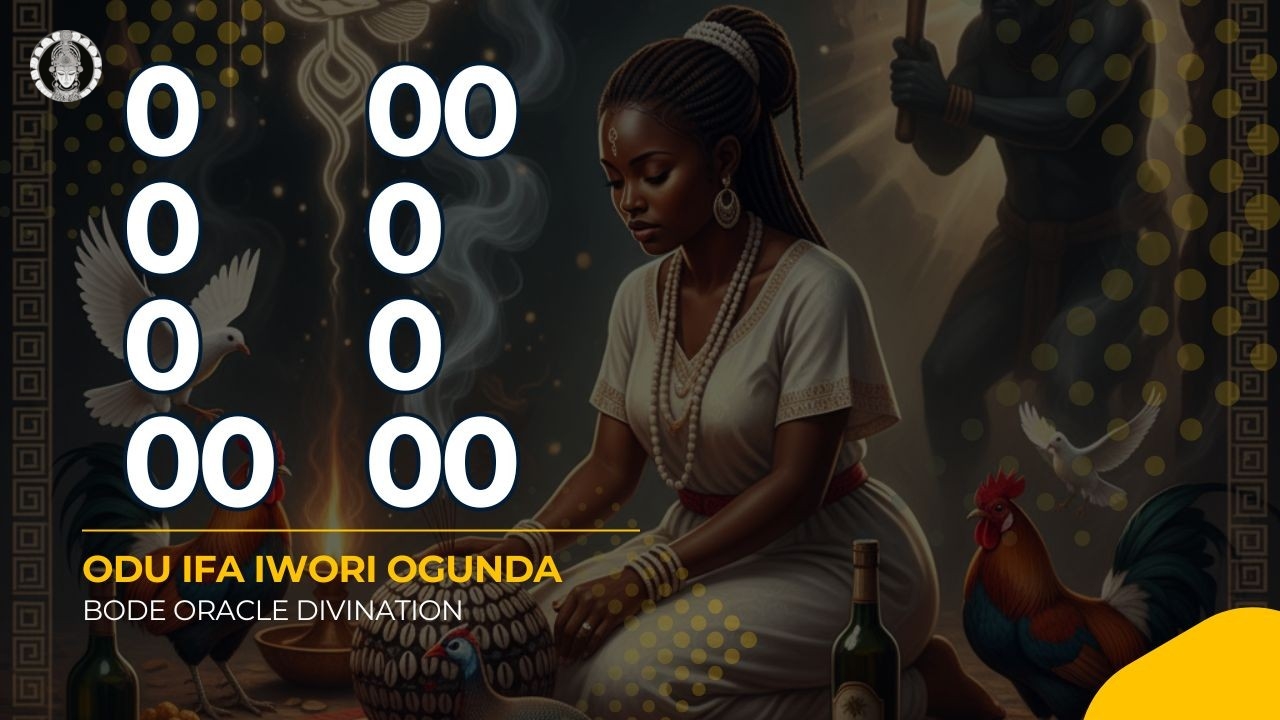
Ifa Divination for Aweda: The Fundamental Choice Between Medicine and Sacrifice
The Character of Aweda: Courage Without Wisdom
This foundational divination introduces us to Aweda, a character whose name has become synonymous with the Odu itself. Aweda is described as someone who is "very brave" or "courageous" (ti o gboju), but whose courage is misplaced. Rather than placing his trust in sacrifice and divine guidance, Aweda relies heavily on medicines and charms (oogun). This character represents a common human archetype—the person who seeks power and protection through mystical means while neglecting spiritual fundamentals.
The Yoruba worldview recognizes that medicines and charms have real power; they are not dismissed as mere superstition. However, Iwori Aweda teaches that this power is limited, temporary, and potentially dangerous when it becomes one's primary spiritual strategy. Medicines can fail, charms can be neutralized by stronger forces, and reliance on them creates a never-ending arms race where one must constantly seek more powerful preparations to counter enemies' escalating mystical attacks.
The Alternative Path: Sacrifice and Good Conduct
Ifa's instruction to Aweda—and to all who receive this Odu—is clear and uncompromising: "Etutu ni ko mon se dada" (One must perform sacrifice and maintain good conduct). The pairing of sacrifice (etutu/ebo) with good conduct (iwa rere/dada) is crucial. Sacrifice without ethical behavior is ineffective, while ethical behavior without sacrifice lacks the spiritual power needed to manifest blessings in the physical realm.
This instruction establishes a spiritual principle that runs counter to magical thinking: there are no shortcuts to lasting protection and prosperity. You cannot buy safety through powerful charms while treating people poorly, nor can you expect divine blessings while neglecting prescribed offerings. The path Ifa prescribes requires both material investment (the sacrifice itself) and personal transformation (good conduct).
The Sacred Verse
Eda ogbogun ebo ni
Ifa ni ka mon se dada
Adifafun aweda ti o gboju
Le oogun ju ebo lo
Nje iwori aweda,
Eda ogbogun
Ebo ni ifa ni ka mon se
English Translation
The person does not rely on medicine but on sacrifice
Ifa says one must maintain good conduct
Divination was cast for Aweda, who was very brave and
Relied on medicine more than sacrifice
Therefore, Iwori Aweda,
The person who does not deal with medicine
But always sacrifices at all times.
Understanding the Prescribed Sacrifice
The ebo for this divination includes two roosters (akuko adie meji), two hens (agbeboadie meji), one large rat (okete kan), palm oil (epo), and eko (fermented corn pudding). Each element carries specific spiritual significance:
- Two roosters: Represent alertness, protection, and the masculine energy needed to defend oneself
- Two hens: Symbolize nurturing, patience, and feminine receptive energy
- Large rat: Signifies resourcefulness, cleverness, and the ability to find provisions
- Palm oil: The universal life force and connector between physical and spiritual realms
- Eko: Sustenance, patience, and the willingness to undergo transformation (fermentation)
The Warning Against Excessive Reliance on Medicine
Ifa's warning is not against medicine itself but against misplaced trust. The divination cautions: "One should not trust so much in medicine but should always sacrifice at all times." This recognizes that medicines have their place but should never become the foundation of one's spiritual practice. Those who rely primarily on charms and preparations often develop a mentality of spiritual warfare—constantly seeking more powerful medicines to counter perceived attacks, living in perpetual fear that their protections might be overcome.
In contrast, those who prioritize sacrifice and good conduct live from a place of spiritual confidence grounded in divine favor rather than mystical power. They understand that no enemy's medicine can overcome the protection of properly performed sacrifice combined with ethical living. This is the liberation that Iwori Aweda offers—freedom from the anxiety of magical arms races and the peace that comes from divine alignment.
Modern Application: Shortcuts and Sustainable Solutions
For contemporary practitioners, this divination speaks powerfully to our modern tendency toward quick fixes and shortcuts. In today's context, "medicine" might represent any number of things people rely on instead of proper spiritual practice: excessive focus on material wealth as the solution to all problems, dependence on other people (mentors, partners, patrons) to provide what only divine alignment can give, reliance on knowledge, credentials, or connections rather than character, or seeking esoteric techniques and advanced practices while neglecting basic spiritual fundamentals.
Iwori Aweda teaches that sustainable success—in any area of life—comes through consistency in spiritual practice, maintenance of ethical standards, regular sacrifice and devotion, and trust in divine timing rather than forcing outcomes through willpower or manipulation.
For deeper understanding of Yoruba cosmology and practice, see this UNESCO documentation on Ifa of the Yoruba people of Nigeria.
Ifa Divination for Orunmila: Marriage Blessing Through Sacrifice
Orunmila's Tears: Even the Wise Need Divine Intervention
This divination presents a profound teaching by showing even Orunmila—the grand priest of Ifa, repository of all wisdom, and divine witness to creation—in a moment of vulnerability. The verse states: "Baba nfomi oju sogbere aya" (The father was crying for the blessing of having a wife). This image of Orunmila weeping challenges any notion that spiritual mastery makes one independent of divine grace or exempt from life's challenges.
The fact that Orunmila must cry for a wife—and more importantly, must perform sacrifice to obtain one—establishes several critical principles. First, marriage is not merely a social arrangement but a spiritual blessing that requires divine approval and intervention. Second, even those with vast spiritual knowledge and power cannot simply manifest their desires through will or wisdom alone; they must still observe proper protocols of sacrifice. Third, there is no shame in acknowledging need and seeking help through prescribed spiritual channels.
The Metaphor of Edu and the Great Rooster
The verse includes a curious phrase: "Nje ekowo wa ewa yan, Edu loko, Akuko gagara koni kowo se oko gbebo" (Come down with your money to choose Edu as your spouse; to the great rooster, the normal sacrifice offering will not be difficult). This metaphor requires unpacking to reveal its wisdom.
Edu refers to a type of dark-colored yam that must be cultivated with care and patience. The instruction to "choose Edu" suggests selecting a spouse who may not be flashy or immediately impressive but who has substance and will provide nourishment. The "great rooster" (akuko gagara) represents the person seeking marriage—someone of substance who understands that significant blessings require significant investment.
The phrase "koni kowo se oko gbebo" (it will not be difficult to perform the normal sacrifice) carries profound meaning: when you are serious about marriage and ready for its responsibilities (symbolized by being a "great rooster"), the sacrifice required will not seem burdensome. Those who balk at the cost of marriage ebo are revealing they're not yet ready for the commitment marriage represents.
The Sacred Verse
Ifa ni iwori aweda
Eda ogboogun
Ebo ni ifa ni ka mon se
Adifafun orunmila
Baba nfomi oju sogbere aya
Ebo ni won ni ko mon se
O si gbe bo nibe orubo
Nje ekowo wa ewa yan
Edu loko
Akuko gagara koni kowo
Se oko gbebo
English Translation
Ifa says Iwori Aweda
The person does not make medicine, but offers sacrifices
Ifa says one must have good conduct
Divination was cast for Orunmila
When he was crying for the blessing of having a wife
He was asked to offer the sacrifice
And he complied
Therefore, come down with your money to choose Edu
As your spouse
For the great rooster, the normal sacrifice offering
Will not be difficult.
The Prescribed Marriage Offering
The sacrifice for marriage blessings includes two hens (agbeboadie meji), two guinea fowls (eye etu meji), one rooster (akuko kan), kola nut (obi), wine/alcohol (oti), palm oil (epo), and eko. This combination addresses multiple dimensions of marriage:
- Two hens: Female energy, fertility, home-building capacity
- Two guinea fowls: Precious offerings showing serious intent, connection to Orunmila
- One rooster: Masculine energy, protection, family leadership
- Kola nut: Communication, clarity, opening of spiritual pathways
- Wine: Joy, celebration, libation to ancestors and deities
The Promise: Blessing Through a Woman
Ifa's message is encouraging: "There are blessings for this person through a lady." The divination recognizes that the person is anxious about marriage and still searching for a spouse. The instruction is clear: perform the sacrifice and then be blessed. The divination promises that the wife will come, and with her will come additional blessings beyond companionship.
Modern Application: Marriage in Contemporary Context
For those receiving this divination today, it speaks to anyone anxious about finding a spouse or facing delays in marriage. The teaching applies whether you're seeking your first marriage, marriage after divorce, or trying to restore a troubled marriage. The principles remain constant: marriage is a spiritual blessing that requires proper sacrifice, anxiety about marriage must be brought to Ifa rather than driving desperate actions, the qualities to seek in a spouse (substance over flash, symbolized by choosing Edu), readiness for marriage is demonstrated by willingness to invest properly in the sacrifice, and maintaining good conduct (iwa rere) is essential for attracting and maintaining a good spouse.
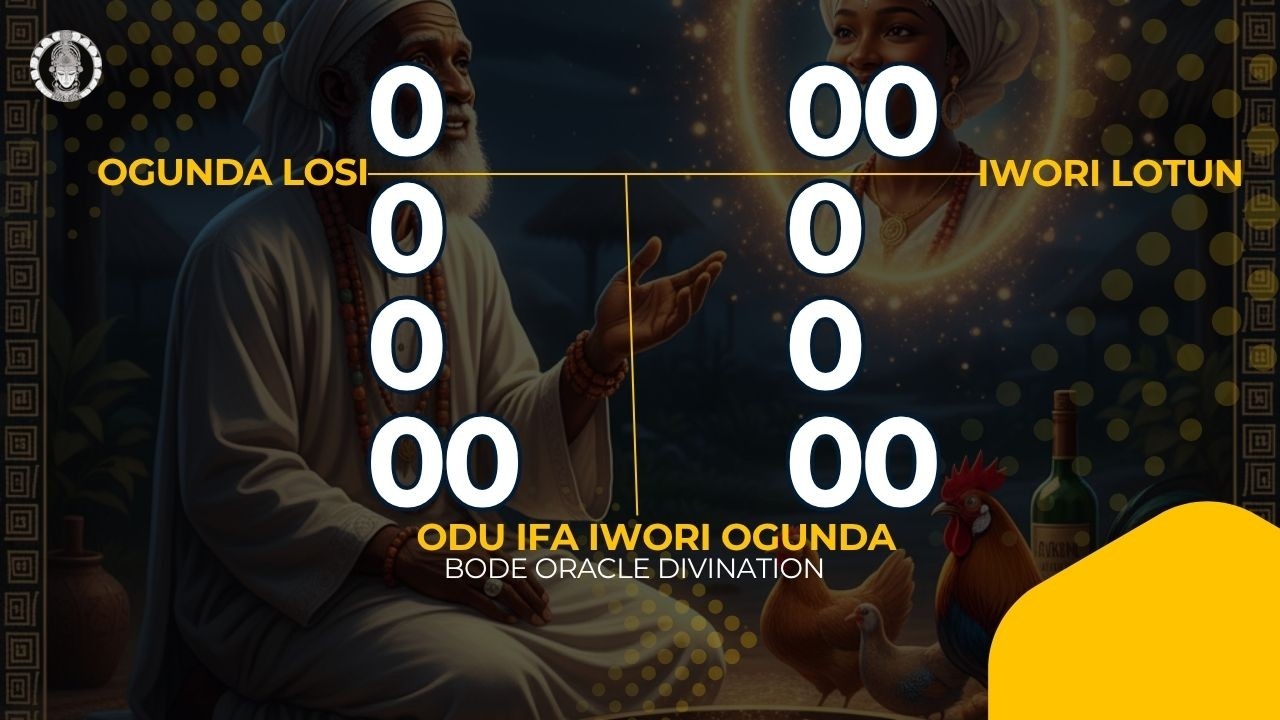
Ifa Divination for Wealth: Righteous Prosperity Through Right Action
Iwori's Way: Things Done According to How They Should Be Done
This divination introduces a fascinating linguistic construction: "Iwori wo oun rere da" (Iwori makes things according to how they should be done). The phrase "wo oun rere da" suggests divine order, proper alignment, and things manifesting according to their true nature. Unlike medicines that attempt to force outcomes or manipulate circumstances, this divination teaches that wealth comes through aligning with divine order and doing things correctly.
The verse continues with a prayer: "Ifa bi o bada rere tan, Ki o se rere ku fun mi" (Ifa, after doing things well, let good things remain for me). This reveals the difference between temporary gains and lasting prosperity. Many medicines and magical works can produce short-term results that quickly dissipate. True wealth—built on proper sacrifice and right conduct—endures and even multiplies over time.
Orunmila Crying for Wealth
Once again, we find Orunmila in tears, this time "crying for the blessing of wealth acquisition" (nfomi oju sogbere aje). The repetition of this image across different divinations within Iwori Aweda serves an important pedagogical purpose: it normalizes the experience of lack even among the spiritually advanced and reinforces that weeping before Ifa is not weakness but wisdom. The proper response to need is not magical manipulation but humble supplication combined with prescribed sacrifice.
What distinguishes the spiritually wise from the foolish is not absence of problems but response to them. The foolish seek magical shortcuts; the wise seek divine guidance and follow prescribed protocols. Orunmila demonstrates the wisdom of bringing one's needs directly to Ifa, performing the prescribed sacrifice, and trusting in divine timing.
The Sacred Verse
Ifa ni iwori wo oun
Rere da
Iwori wo oun rere da
Ifa bi o bada rere tan
Ki o se rere ku fun mi
Adifafun orunmila
Baba nfomi oju sogbere aje
Ebo ni won ni ko mon se
Osi gbebo nibe orubo
Nje iwori worere da fun miwa
English Translation
Ifa says Iwori makes things according to how they should be done
Iwori makes things according to how they should be done
Ifa, after doing things well
Let good things remain for me
Divination was cast for Orunmila
When he was crying for the blessing of wealth acquisition
He was asked to offer the sacrifice
And he complied
Therefore, I seek a good outcome from Iwori and bring it to me.
The Channel: Blessings Through One's Children
Ifa adds a specific detail: wealth will come "through one of the children of your elder or younger sibling" (nipase omo iyare kan ti yio laa). This reveals an important principle about how blessings manifest—often through unexpected channels and relationships. The wealth doesn't come directly from the heavens but through human relationships and family connections.
This teaching guards against spiritual isolation. Some people become so focused on their personal spiritual practice that they neglect family relationships and social connections. Ifa reminds us that blessings often flow through the very relationships we might be tempted to neglect. The instruction to honor one's nieces and nephews, to maintain good relations with siblings, and to invest in extended family becomes not just ethical obligation but practical wealth strategy.
The Prescribed Wealth Offering
The sacrifice includes two pigeons (eyele meji), two roosters (akuko adie meji), two guinea fowls (eyeetu meji), palm oil (epo), and eko. This combination addresses wealth from multiple spiritual angles:
- Two pigeons: Peace, multiplication, gentle energy that attracts rather than forces prosperity
- Two roosters: Vigilance, early awareness of opportunities, protective alertness over one's finances
- Two guinea fowls: Serious commitment to wealth work, precious offering showing recognition of wealth's value
- Palm oil and eko: The foundation—life force and patience necessary for wealth to develop
Modern Application: Sustainable Wealth Building
For contemporary practitioners, this divination speaks to anyone seeking financial breakthrough, struggling with career stagnation, envying others' prosperity while remaining stuck, tempted to pursue wealth through questionable means, or seeking to build generational wealth rather than just personal comfort.
The teaching emphasizes that lasting wealth comes through doing things correctly (proper business practices, ethical conduct), performing regular sacrifice to maintain spiritual alignment with prosperity, maintaining good family relationships as channels for blessings, patience to allow wealth to develop naturally rather than forcing quick results, and gratitude and generosity that keeps wealth flowing rather than stagnating.
Explore the systematic nature of Ifa wisdom through this scholarly study on the algebraic characterization of Ifa divination codes.
Propitiating Ori: The Foundation of All Blessings
The Relationship Between Inner and Outer Destiny
This profound divination addresses the relationship between Ori (inner spiritual head/destiny) and one's outer circumstances. The verse mentions "Ori" and "Ire gbogbo" (all good things), revealing that Ori is the ultimate source from which all blessings flow. No matter how many sacrifices one performs to external deities, without proper alignment and propitiation of one's own Ori, blessings cannot fully manifest.
The Yoruba concept of Ori deserves careful explanation. Ori is not merely the physical head but represents one's personal destiny, spiritual consciousness, and individual portion of divinity. Before birth, each person's Ori kneels before Olodumare (the Supreme Being) and chooses their destiny. Success in life depends largely on maintaining good relationship with this inner spiritual force that actually chose one's life path and knows the way to fulfill it.
Ori Crying for All Good Things
The divination was cast "for Ori, when crying with tears for all good things" (nijo ti fi omi oju sogbere ire gbogbo). This anthropomorphizing of Ori—showing it weeping and seeking blessings—teaches that even our own destiny requires support and propitiation. Your Ori wants you to succeed, but it needs proper honor and feeding to fully actualize the blessings it selected for you before birth.
The verse concludes with a prayer: "Ire gbogbo, Esa re wa ba ori duro, Ori o ni ire gbogbo" (All good things, come and stand with Ori, Ori will have all good things). This reveals the spiritual mechanics: blessings exist in potential, but they must be called to align with one's Ori. Through proper sacrifice and propitiation of Ori, these blessings are drawn from potential into manifestation.
The Sacred Verse
Iwori aweda
Eda o gbo ogun
Ebo ni ifa ni ka mon se
Adifafun ori
Nijo ti fi omi oju
Sogbere ire gbogbo
Ebo ni won ni ko mon se
Osi gbebo nibe orubo
Nje ire gbogbo
Esa re wa ba ori duro
Ori o ni ire gbogbo
English Translation
Iwori Aweda
The person does not rely on medicine
But on sacrifice
Divination was cast for Ori (inner spiritual head)
On the day it was crying
For all good things
They were advised to offer sacrifice
And they complied
Therefore, all good things
Come and stand with Ori
Ori will have all good things
The Critical Warnings in This Divination
Ifa provides three essential warnings for those receiving this divination:
1. Never trust only in medicine: Even in the context of propitiating Ori, the core message of Iwori Aweda remains. People seeking to empower their Ori sometimes turn to head medicines and preparations, but Ifa warns that these alone are insufficient. Proper sacrifice to Ori takes precedence over mystical medicines.
2. Always provide special food for the witches: The instruction to "peese fun awon agbalagba" (provide food for the elders/witches) reveals crucial wisdom. In Yoruba cosmology, Iyami (the mothers/witches) have significant power over whether one's Ori can manifest its blessings. Regular propitiation of these forces through food offerings prevents them from blocking the path between your Ori's intentions and their manifestation in your life.
3. Always be sacrificing at all times: This emphasizes that Ori propitiation is not a one-time event but an ongoing relationship. Just as you must regularly feed your physical body, so must you regularly feed your spiritual head through sacrifice and offerings.
The Prescribed Ori Offerings
The sacrifice includes two guinea fowls (eye etu meji), two roosters (akuko adie meji), two pigeons (eyele meji), one large rat (okete), kola nut (obi), and wine (oti). Additionally, one guinea fowl must be used specifically to propitiate Ori along with kola nut and wine.
The special Ori feeding with guinea fowl, kola, and wine creates direct connection between your conscious self and your spiritual destiny. The guinea fowl's speckled pattern mirrors the wisdom patterns of Ifa itself, the kola nut opens channels of communication with your Ori, and the wine creates the cool, peaceful state in which Ori can speak clearly to your consciousness.
Modern Application: Aligning With Your True Path
For contemporary practitioners, this divination speaks to anyone feeling blocked despite effort, sensing that their life is not fulfilling its potential, experiencing a disconnect between their talents and their achievements, feeling that success comes hard while others seem to flow easily, or seeking to understand and align with their true life purpose.
The teaching reveals that these struggles often indicate poor relationship with one's Ori. The solution involves regular Ori propitiation through sacrifice and offerings, feeding Iyami (the mothers/witches) to remove blockages, maintaining ethical conduct so Ori is not ashamed of your behavior, listening to inner guidance and intuition (the voice of Ori), and trusting the path your Ori chose rather than constantly fighting against your true nature.
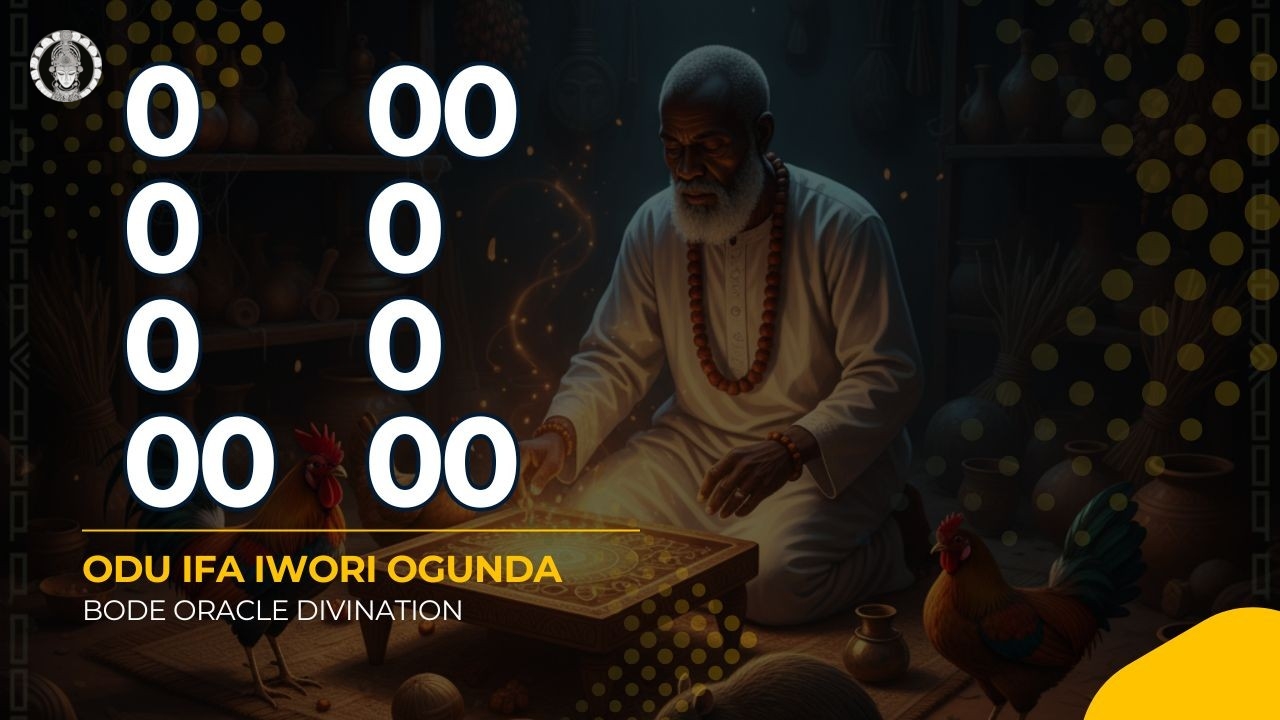
Victory and Wealth Medicines (Akose Iwori Aweda)
The Paradox: Medicines Within the Anti-Medicine Odu
It may seem paradoxical that Iwori Aweda—the Odu that explicitly warns against relying on medicine—also prescribes specific medicinal preparations. This apparent contradiction reveals sophisticated spiritual understanding: the issue is not with medicines themselves but with misplaced priority and reliance. Medicines have their place in Ifa practice, but they must always be secondary to sacrifice and good conduct.
The medicines prescribed in Iwori Aweda are meant to be used only after proper sacrifice has been performed and only in conjunction with maintenance of good character. They are amplifiers of spiritual work already done, not substitutes for it. This understanding prevents the common error of seeking magical solutions while neglecting spiritual fundamentals.
Isegun: The Victory Medicine
The victory preparation includes three heads of large rats (ori okete meta), many "don't touch my child" leaves (ewe mon fowo ba omo mi pupo), and three whole alligator peppers (odidi atare meta). These are burned together, ground to powder, Ifa verses are chanted over them, and the powder is taken with cold eko every night before bed.
Spiritual components explained:
- Rat heads: Rats are resourceful survivors who outwit predators; their heads contain the intelligence and awareness needed to anticipate and avoid danger
- "Don't touch my child" leaves: These create spiritual boundary and protection, warning enemies to keep away
- Alligator peppers: Add heat and potency, representing the fierce protection that repels attacks
- Cold eko at night: The coolness and nighttime application create the optimal spiritual state for the medicine to work during vulnerable sleep hours
Aje: The Wealth Medicine
The wealth preparation uses Aje herbs together with Etiponola herbs, ground together and used to cook two snails. Prayer is recited thoroughly over the preparation, and the entire meal must be eaten.
Spiritual components explained:
- Aje herbs: Specifically associated with attracting wealth and prosperity
- Etiponola herbs: The name suggests "ears that hear wealth/prosperity"—opening one's spiritual receptivity to opportunities
- Two snails: Snails carry their homes on their backs, symbolizing self-sufficiency and the gradual, steady accumulation of resources
- Complete consumption: Eating the entire preparation represents total integration of the wealth consciousness into one's being
Critical Instructions for Medicine Preparation
These medicines should only be prepared and used under specific conditions:
1. After proper sacrifice: Never use these medicines without first performing the prescribed ebo for your situation. The medicines only work effectively when the spiritual groundwork has been laid through sacrifice.
2. With qualified guidance: A trained Babalawo should prepare these medicines or at minimum provide proper instruction. The grinding, the incantations, the timing—all matter significantly.
3. With good conduct: Using medicines while engaging in unethical behavior negates their effectiveness and can even turn them against you. The medicines amplify what you already are—if your character is poor, they amplify that.
4. With reasonable expectations: These medicines enhance spiritual work; they don't replace practical effort. The victory medicine helps you avoid enemies and navigate conflicts, but you must still maintain vigilance. The wealth medicine opens you to opportunities, but you must still work and make wise decisions.
Modern Adaptations and Substitutions
For practitioners in locations where specific ingredients are unavailable, consult with a knowledgeable Babalawo about appropriate substitutions. The spiritual essence of the ingredients matters more than exact botanical identity. However, never substitute randomly—improper substitutions can render the medicine ineffective or even dangerous.
Additional Resources
Internal Links
- Complete Guide to Iwori Ogunda - Detailed taboos and practices
- Explore All Odu Ifa - Comprehensive divination signs library
- Bode.ng Blog - Extensive collection of Ifa and Yoruba spirituality articles
- All About the 16 Odu Ifa and Their Meaning
External Resources
- African Traditional Religions: Ifa Divination - Academic Guide
- Ifa of the Yoruba People of Nigeria - UNESCO Archives
- Algebraic Characterization of Ifa Divination Codes - Research Paper
- Ifa Divination System - UNESCO Intangible Cultural Heritage
- Ifa - Wikipedia Overview
Connect With Our Community
- BODEOracle on TikTok - Daily spiritual wisdom and teachings
- BODEOracle on YouTube - In-depth divination lessons
- BODEOracle on Facebook - Community discussions
- BODEOracle on X (Twitter) - Updates and insights
- BODEOracle on Pinterest - Visual spiritual guides
Visit Bode.ng to explore more divination teachings, participate in quizzes and polls, and connect with our community of practitioners and learners. Register today to access exclusive content, request personal divination readings, and receive personalized guidance on your spiritual journey.
Frequently Asked Questions About Odu Ifa Iwori Ogunda (Iwori Aweda)
Find answers to common questions about this sacred Odu Ifa and its powerful divination teachings
Iwori Ogunda, known as Iwori Aweda, is one of the 256 sacred Odu in the Ifa corpus. The name "Iwori Aweda" translates as "the one who does not rely on medicine but on sacrifice." This Odu teaches that true power and lasting transformation come through proper sacrifice (ebo), good conduct (iwa rere), and faithful devotion rather than through magical medicines and charms (oogun).
The central philosophy warns against placing excessive faith in mystical solutions while neglecting spiritual fundamentals, promising that those who prioritize sacrifice and good character will receive blessings that no medicine can provide.
Iwori Aweda doesn't reject medicine entirely but warns against misplaced reliance. Medicines and charms have real power in Yoruba spirituality, but this power is limited, temporary, and potentially dangerous when it becomes one's primary spiritual strategy. Relying primarily on medicine creates a never-ending cycle of seeking more powerful preparations to counter enemies' attacks.
The Odu teaches that sustainable protection and prosperity come through proper sacrifice combined with ethical behavior. Those who prioritize sacrifice and good conduct live from spiritual confidence grounded in divine favor rather than magical power, freeing them from the anxiety of spiritual warfare.
Aweda represents the brave person who relies heavily on medicines and charms rather than sacrifice. Despite his courage, his approach is fundamentally flawed. Ifa instructs him to perform sacrifice and maintain good conduct instead of trusting in magical protections.
This teaches that courage without spiritual wisdom is insufficient. True protection comes not through mystical arms races but through proper sacrifice, ethical living, and divine alignment. The prescribed offering includes roosters, hens, a large rat, palm oil, and eko—all working together to provide protection that medicines alone cannot give.
The divination shows even Orunmila crying for the blessing of having a wife, establishing that marriage is a spiritual blessing requiring divine intervention. The verse instructs to "choose Edu" (a substantial, nourishing yam) as spouse—symbolizing substance over flashy appearance.
The "great rooster" metaphor suggests that when you're truly ready for marriage's responsibilities, the required sacrifice won't seem burdensome. The offering includes hens, guinea fowls, rooster, kola nut, and wine. Ifa promises blessings through a woman for those anxious about marriage who perform the sacrifice and maintain good conduct.
This phrase ("Iwori wo oun rere da") suggests divine order, proper alignment, and things manifesting according to their true nature. Unlike medicines that attempt to force outcomes or manipulate circumstances, wealth comes through aligning with divine order and doing things correctly.
The accompanying prayer—"let good things remain for me"—distinguishes temporary gains from lasting prosperity. True wealth built on proper sacrifice and right conduct endures and multiplies over time, unlike short-term results from magical works that quickly dissipate.
Ifa specifies that wealth will come "through one of the children of your elder or younger sibling"—revealing that blessings often flow through unexpected channels and family relationships. This guards against spiritual isolation and emphasizes maintaining good relations with extended family.
The prescribed offering includes pigeons (for peace and multiplication), roosters (for vigilance), guinea fowls (showing serious commitment), palm oil, and eko. Lasting wealth comes through doing things correctly, performing regular sacrifice, maintaining good family relationships, exercising patience, and practicing gratitude and generosity.
Ori is your inner spiritual head, personal destiny, and individual portion of divinity. Before birth, each person's Ori kneels before Olodumare and chooses their destiny. Success depends on maintaining good relationship with this inner spiritual force that actually chose your life path and knows how to fulfill it.
No matter how many sacrifices you perform to external deities, without proper alignment and propitiation of your Ori, blessings cannot fully manifest. The divination prescribes guinea fowls, roosters, pigeons, large rat, kola nut, and wine, with specific Ori feeding using guinea fowl, kola, and wine to create direct connection with your spiritual destiny.
The instruction to "provide special food for the witches" (peese fun awon agbalagba) reveals crucial wisdom. In Yoruba cosmology, Iyami (the mothers/witches) have significant power over whether one's Ori can manifest its blessings.
Regular propitiation of these forces through food offerings prevents them from blocking the path between your Ori's intentions and their manifestation in your life. This is not about fear but about maintaining good relationships with powerful spiritual forces that can either facilitate or obstruct your destiny's fulfillment.
This apparent paradox reveals sophisticated understanding: the issue isn't medicines themselves but misplaced priority. Medicines have their place but must always be secondary to sacrifice and good conduct. The medicines prescribed in Iwori Aweda are meant to be used only after proper sacrifice and only in conjunction with maintaining good character.
They are amplifiers of spiritual work already done, not substitutes for it. The victory medicine (using rat heads, protective leaves, and alligator peppers) and wealth medicine (using Aje and Etiponola herbs with snails) only work effectively when the spiritual groundwork has been laid through proper sacrifice and ethical living.
Iwori Ogunda prescriptions vary by specific situation:
- For general protection: Two roosters, two hens, one large rat, palm oil, and eko
- For marriage: Two hens, two guinea fowls, one rooster, kola nut, wine, palm oil, and eko
- For wealth: Two pigeons, two roosters, two guinea fowls, palm oil, and eko
- For Ori propitiation: Two guinea fowls, two roosters, two pigeons, one large rat, kola nut, and wine
The specific prescription should be confirmed through proper divination with a qualified Babalawo.
"Good conduct" (iwa rere/dada) in Iwori Aweda means ethical behavior, honesty, kindness, humility, respect for elders and authorities, generosity and care for family and community, keeping one's word and honoring commitments, avoiding malicious speech and actions, treating others with dignity, and living in alignment with spiritual principles.
The Odu emphasizes that sacrifice without ethical behavior is ineffective. The pairing of sacrifice with good conduct creates the complete spiritual package needed for lasting blessings. Your character must support what your sacrifice requests—you cannot behave poorly while expecting divine favor.
For authentic Iwori Ogunda (Iwori Aweda) divination and spiritual guidance:
- Consult a qualified Ifa priest (Babalawo) trained in traditional divination methods
- Visit Bode.ng to request personal divination readings
- Explore detailed Iwori Ogunda resources including complete taboos and practices
- Join the Bode Oracle community for ongoing spiritual education
- Follow BODEOracle on social media platforms for daily teachings and guidance
Remember that medicines prescribed in this Odu should only be prepared under qualified guidance. The preparation, incantations, and timing all matter significantly for effectiveness and safety.
